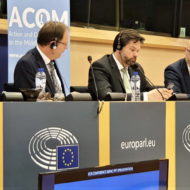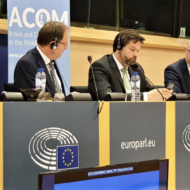
Evidence of ‘Deep-Seated’ Link Between ‘Palestinian Prisoner Solidarity Network’ and Iran, New Report States

According to report, group known as Samidoun ‘serves as an affiliate for the Popular Front for the Liberation of Palestine terror group.’
By JNS
In a symposium on Wednesday in the European Parliament about countering radicalization, extremism and terrorism, members heard from colleagues and international legal experts about the need for the European Union to ban Samidoun: Palestinian Prisoner Solidarity Network.
The International Legal Forum (ILF) recently released a 22-page report calling on Europe to designate Samidoun as a terror group. Founded in 2012, Samidoun “serves as an affiliate for the Popular Front for the Liberation of Palestine (PFLP) terror group,” per the report.
“In 2021, the Israeli government designated Samidoun a terrorist organization on the basis of overwhelming and compelling evidence of the group’s connection to PFLP, which has also been proscribed as a terror group by the E.U., as well as the United States, Canada, Israel and others,” the report adds.
“Samidoun and Iran are two sides of the same jihadist coin,” Arsen Ostrovsky, CEO of ILF, told JNS.
“The decision to designate them as a terrorist organization, whether by the European Union or the United States, should not be done as some favor to Israel, but because continuing to ignore their lethal antisemitism and inseparable connection to Iran would be inexcusable negligence and a direct and clear security threat, including to the United States, where Samidoun is also active and continues to fundraise for their global operations,” explained Ostrovsky.
Ostrovsky and Patricia Teitelbaum, chair of the Brussels-based International Movement for Peace and Coexistence (IMPAC), co-wrote a Newsweek op-ed on Tuesday titled “How Iran’s Tentacles Are Reaching Into Europe.”
“Most of the prisoners for whom Samidoun advocates are no mere common criminals,” the two wrote. “They are murderers and convicted terrorists with ties to PFLP, including Ahmad Sa’adat, who in 2001 assassinated Israeli tourism minister Rehavam Ze’evi in Jerusalem, and Georges Ibrahim Abdallah, who is serving a life sentence in France for his role in the 1982 murder of American and Israeli diplomats in Paris.”
“It is utterly incomprehensible,” they added, “that the E.U. has not yet designated Samidoun a terror group.”
‘A clear and evident threat to public security’
At the symposium in Parliament, which was convened by Teitelbaum and drew about 100 people, Ostrovsky said there is “irrefutable evidence of a deep-seated and systematic connection between Samidoun and the Islamic Republic of Iran, which continues to spread its tentacles of terror across Europe, through proxy groups like Samidoun.”
The group “presents a direct, clear and unequivocal security threat to the European Union and E.U. citizens,” he added. “Enough is enough—the E.U. must take immediate steps, as required under E.U. law, to invoke the process of designating Samidoun and their senior leaders to the E.U. terror list.”
Teitelbaum attended a Samidoun “March of Return and Liberation” rally in Brussels on Oct. 29, 2022, and said she was shocked by what she saw and heard. Mohammed Khatib, Samidoun’s European Coordinator who led the rally, praised murderous terrorists and called for genocide “by all means necessary,” as well as using bullets and missiles to defeat the European Union and the United States, reported Teitelbaum.
Samidoun has chapters in Belgium, France, Spain, Germany, Netherlands, Greece, Hungary, Sweden, the United States, Canada, Brazil, Lebanon, Iran and the Palestinian Authority, according to the new ILF report.
At the March 29 symposium, Angel Mas, president of the Spanish NGO Action and Communication on the Middle East (ACOM) said Samidoun’s Spanish is one of its most active. “Supported by the Islamic Republic of Iran, its goal is to import is fanatical methods to Europe,” he said. “That makes Samidoun a clear and evident threat to public security.”
Itai Reuveni, director of communications at NGO Monitor, added that “Europe must ensure that taxpayer funds are not provided to terror-linked actors, and those actors are not misusing the strong and valuable European freedom of speech, especially on European soil.”
He added that “failing to do so not only endangers the lives and safety of people, it also empowers radical hard-line elements at the expense of moderates.”
The post Evidence of ‘Deep-Seated’ Link Between ‘Palestinian Prisoner Solidarity Network’ and Iran, New Report States first appeared on United with Israel.
United with Israel